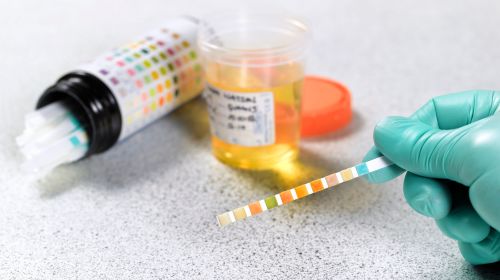The kidneys serve as a filter and excretory organ. In acute kidney failure, their function can deteriorate rapidly within a few hours. What symptoms indicate this and what causes could be behind it.
- © LIGHTFIELD STUDIOS – adobe.stock.com
Quick overview: Acute kidney failure (ANF)
Definition: Acute kidney failure refers to a temporary, sudden onset of inadequate or completely lost kidney function.
Symptoms: The amount of urine excreted usually decreases first. General symptoms such as nausea, weakness, seizures or kidney pain follow later.
Diagnosis: Blood and urine tests as well as an ultrasound of the kidneys are important. Further diagnostic steps such as X-rays or CT may be necessary.
Treatment: Therapy depends on the underlying cause. Fluid and electrolyte deficiencies must be compensated for quickly. In severe cases, temporary renal replacement therapy in the form of dialysis may be required.
Course: Acute kidney failure can be life threatening. However, if detected and treated in a timely manner, the prognosis is often good. If the kidneys recover completely, it can even heal without any consequences.
Article contents at a glance:
What is acute kidney failure?
Acute kidney failure (ANV, acute kidney failure, AKI) is a generally reversible deterioration in kidney function that occurs within hours to days and is associated with an increased risk of mortality. Prompt treatment is essential.
As kidney function declines, the glomerular filtration rate (GFR) decreases and toxins accumulate in the body. Urine production can be normal, reduced or even stopped completely. If there is no urine excretion (diuresis), significant water retention in the body is possible. Acute kidney failure can progress into chronic kidney failure.
Symptoms: Signs of acute kidney failure
A very early symptom of acute kidney failure is a decrease in urine output (oliguria). The amount of urine excreted is then less than 500 milliliters per day. If urine production drops even further or stops completely, it is called anuria.
The following symptoms are possible with acute kidney failure:
Causes: Why does acute kidney failure occur?
The reasons for acute kidney failure are usually that the kidneys have poorer blood flow or are directly damaged. Less commonly, impaired urinary flow is the trigger for acute kidney failure. Depending on the location of the cause, experts differentiate between different forms:
prerenal kidney failure (the cause lies in the kidneys): It is the most common form and usually affects older people. The kidneys have poorer blood flow and no longer produce urine. The reasons for this are often inflammation, burns, heart disease (heart failure), blood poisoning (sepsis) or accidents and operations that involve significant fluid and blood loss.
intrarenal renal failure (The cause lies in the kidneys themselves): In this form, the kidney tissue is damaged. Acute kidney failure can be the result of kidney disease such as inflammation of the kidneys (nephritis) or inflammation of the kidney cells (glomeruli). Infections with viruses or bacteria can also damage the kidneys.
postrenal kidney failure (The cause lies in the urinary tract): If the urinary tract is narrowed or blocked, the urine builds up and ultimately flows back into the kidneys. Then the kidneys become damaged. Possible causes of narrowing include kidney stones, bladder stones, urinary stones, tumors, benign prostate enlargement or a narrowed urethra.
In addition, some medications are harmful to the kidneys, such as certain painkillers such as ibuprofen and diclofenac, cytostatics (drugs used in chemotherapy) or X-ray contrast agents. Relevant information can usually be found in the package insert and will be explained in the medical consultation. Heavy metals and alcohol can also cause kidney damage.
Diagnosis: This shows that the kidneys are failing
There are various parameters that are used to diagnose acute kidney failure. First, as part of the anamnesis clarified the extent to which chronic pre-existing illnesses such as diabetes mellitus are present. Taking medications that are toxic to the kidneys is also relevant. During the physical examination of the patients For example, blood pressure, bladder filling or kidney palpitations are investigated.
Further diagnostic steps can then be taken:
Blood test: For example, the values for uric acid and electrolytes such as sodium and potassium are examined.
Urine tests: Of interest are proteinuria (increased protein loss through urine), urea and creatinine. An increase in creatinine indicates a decline in kidney performance.
Urine volume and urine sediment: The amount of urine excreted provides information about the severity and progression of acute kidney failure.
Electrocardiography (ECG): For example, it is clarified whether cardiac arrhythmias are a sign of hyperkalemia (increased potassium levels in the serum). Reduced potassium excretion via the kidneys is characteristic of renal insufficiency.
imaging examinations: An ultrasound examination of the kidneys is usually carried out. A chest x-ray, computed tomography (CT) or magnetic resonance imaging (MRI) of the lower abdomen are also possible. If a renal artery occlusion is suspected, scintigraphy with weakly radioactively labeled substances can also be used.
Kidney biopsy: Removing tissue can provide information about changed kidney tissue.
Treatment for acute kidney failure
There is currently no specific drug therapy for kidney failure. Rather, treatment consists of eliminating the triggering causes while alleviating the symptoms or complications of kidney dysfunction. Some examples:
Doctors correct a urinary flow disorder by removing obstructions such as kidney stones.
Bacterial infections can be treated with antibiotics.
If kidney-damaging medications are the reason for kidney failure, the dose should be adjusted, the medication discontinued or switched to another preparation in consultation with a doctor.
Large blood and fluid losses after accidents or operations can be compensated for with the help of infusions or blood transfusions.
If urine output is reduced, diuretics help to increase urine production.
Blood washing (dialysis) cleans and detoxifies the blood outside the body. Renal replacement therapy is necessary until kidney function has improved again.
Complications of kidney failure should be prevented if possible. As long as kidney insufficiency is present, it is therefore necessary to balance the fluid and electrolyte balance and to prevent the accumulation of urinary substances such as urea, uric acid or creatinine.
Despite rapid treatment, acute kidney failure is a serious illness. For example, if it occurs as part of multi-organ failure, kidney failure is still associated with a high mortality rate.
Course and prognosis of acute kidney failure
In acute kidney failure, the amount of urine excreted provides important information about the progress of the disease. In the most common form of acute kidney failure, the amount of urine can deviate significantly from the normal amount of 1 to 1.5 liters per day, depending on the stage.
Forms of acute renal failure that are not accompanied by the symptom of reduced urine output occur less frequently and often have a more favorable prognosis.
In pre- and post-renal acute renal failure, kidney function can usually be completely restored if the causes of the symptoms are eliminated in a timely manner. In the case of intrarenal acute kidney failure, the prognosis is worse, especially if the kidney tissue has already been significantly damaged before treatment begins. If this is the case, there is a risk of the acute symptoms turning into chronic kidney failure.



